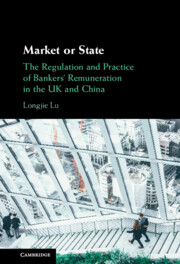Book contents
- Market or State
- Market or State
- Copyright page
- Dedication
- Contents
- Figures
- Tables
- Preface
- Abbreviations
- 1 Introduction
- 2 The Pre-GFC Practice of Bankers’ Remuneration in the UK
- 3 The Regulation of Bankers’ Remuneration in the UK
- 4 The Post-GFC Practice of Bankers’ Remuneration in the UK
- 5 The Traditional Practice of Bankers’ Remuneration and Incentives in China
- 6 The Regulation of Bankers’ Remuneration in China
- 7 The Recent Practice of Bankers’ Remuneration and Incentives in China
- 8 Market or State: Differences in the Regulations and Practices of Bankers’ Remuneration in the UK and China
- 9 Conclusion
- Book part
- Bibliography
- Index
5 - The Traditional Practice of Bankers’ Remuneration and Incentives in China
Published online by Cambridge University Press: 15 September 2022
- Market or State
- Market or State
- Copyright page
- Dedication
- Contents
- Figures
- Tables
- Preface
- Abbreviations
- 1 Introduction
- 2 The Pre-GFC Practice of Bankers’ Remuneration in the UK
- 3 The Regulation of Bankers’ Remuneration in the UK
- 4 The Post-GFC Practice of Bankers’ Remuneration in the UK
- 5 The Traditional Practice of Bankers’ Remuneration and Incentives in China
- 6 The Regulation of Bankers’ Remuneration in China
- 7 The Recent Practice of Bankers’ Remuneration and Incentives in China
- 8 Market or State: Differences in the Regulations and Practices of Bankers’ Remuneration in the UK and China
- 9 Conclusion
- Book part
- Bibliography
- Index
Summary
This chapter describes and analyses the traditional way adopted by Chinese banks to manage and incentivise bankers in the context of state ownership and intervention. It provides an overview of the modernisation reform of Chinese banks and argues that the essential factor that contributed to the successful reform was the predominant role of the state. The governance of banks was subject to state intervention, and bankers were identified and managed as state cadres. Therefore, bankers’ remuneration was administratively managed, and bankers were incentivised with the opportunity of political promotion. Reciprocally, the administration of remuneration and political incentives acted as a channel for state intervention in banks. However, this administrative and politicised approach was inconsistent with the principles of modern corporate governance, and reform to push forward the modernisation of bankers’ remuneration was considered necessary.
Keywords
- Type
- Chapter
- Information
- Market or StateThe Regulation and Practice of Bankers' Remuneration in the UK and China, pp. 89 - 125Publisher: Cambridge University PressPrint publication year: 2022

